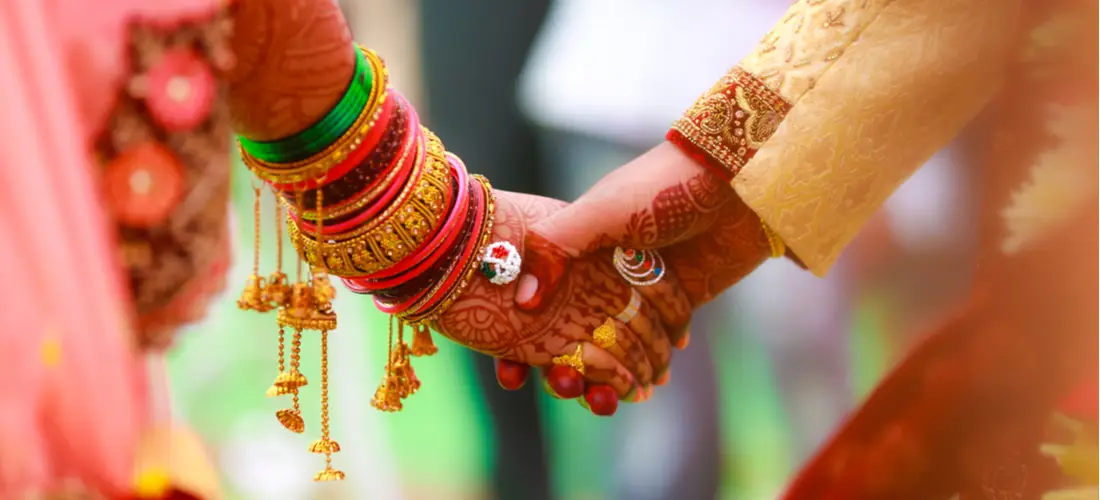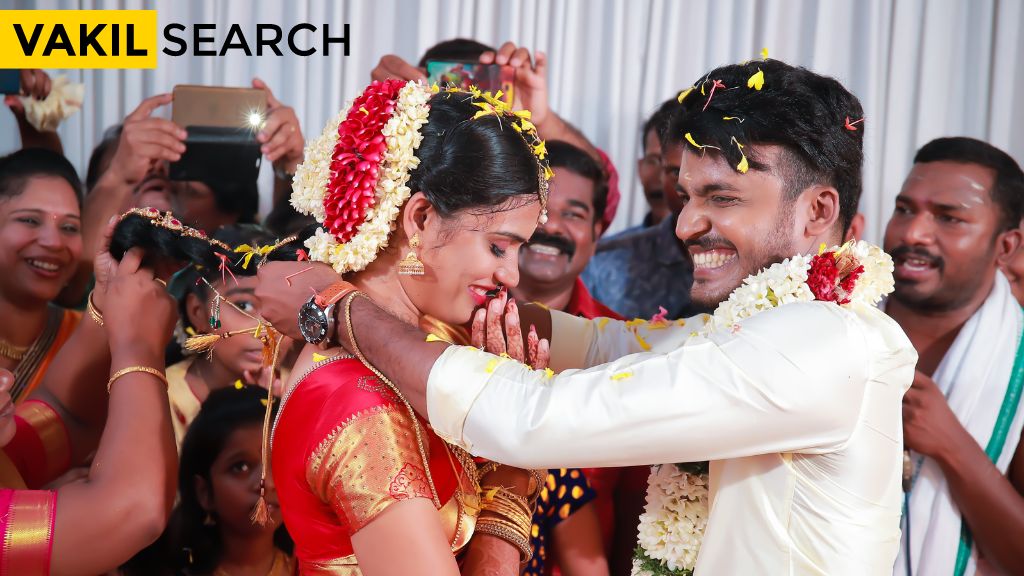Because of a new law passed in 2018, foreign spouses of Indian nationals have a better chance of obtaining privileged OCI cards that grant multiple entries, multi-purpose, and life-long visas for visits to India. Please tell us more about how an Indian can marry a foreigner in India.
Here’s what you should know if you’re looking for your soulmate. They live in another country or continent, across oceans, and you can’t wait to meet them in India. Even if you believe that love, compatibility, and a sense of togetherness are all you need, the legal process and time involved with joining your soulmate may be something to consider while planning your union.
Indian Get Married To A Foreigner In India are governed by the Special Marriage Act, which is a law that governs such marriages. Moreover, the Special Marriage Act is also a law that governs marriages not only between people belonging to different religions but also to different castes and backgrounds; hence, a marriage between a person of another nationality is also governed by this law. In addition, it is important to point out that for a citizen of India seeking to marry outside of India, the provisions of the Foreign Marriage Act, passed in 1969, apply. The legal age for marriage in India for girls is 18 years. For boys, 21 years, the same rule extends to marriage with a foreign national, even though their country’s domestic law may prescribe a higher or lower age for marriage.
The Special Marriage Act, in addition to prescribing the age limit, also mentions degrees of prohibited relationships, such as mothers, stepmothers, grandmothers, step-grandmothers, etc. The Central Information Commission, while highlighting the applicability of the Special Marriage Act, has also categorically clarified that if the groom and bride belong to different religions or countries, they have to marry under the Special Marriage Act, 1954, as they are not permitted to marry under personal marital laws. Some people may not desire to perform marriage as per their religious customs and prefer marriage under the Indian Get Married to a Foreigner .
There is a 30-day notice requirement to be given in India if one partner is permanently and the other temporarily resides in India. Marriages between an Indian and a foreign national also shall be registered under this Act. Suppose one partner is residing in a foreign country. In that case, the ‘Marriage Notice’ form must be filled by the partner in India and the partner in the foreign country, which has to be resubmitted by the partner in India to the Registration office.
Documents, Formalities, and Certifications needed
Before solemnising your marriage, you should ensure that the following documents are ready:
- Birth certificates (for age proof)
- A valid visa of more than thirty days for the foreign national
- Both parties sign a single-status affidavit. Suppose one of the parties has married previously. In that case, the Divorce Decree (for divorcees) or Certificate of Death (for widowed) is necessary.
- Address proof and passport-size photographs
- Adequate documentary evidence of 30-day residence in India
- A ‘no-objection’ letter – For instance, if an American citizen wishes to wed in a civil marriage ceremony, he may be required to present to the marriage officer a ‘no objection letter from the US Embassy or Consulate, as well as proof of termination of any previous marriage if any. Similarly, a citizen of any other foreign country must present a no-objection letter from the Embassy or Consulate of their country.
Is the Performance of Rituals and Ceremonies Enough?
While we may associate a Marriage in India with extensive rituals like walking around the fire, a lot of music, and exchanging garlands, the Court has clarified that any couple, whether Indian, NRI, or a foreigner, who wants to marry in India has to either perform a religious marriage ceremony or the civil marriage ceremony even if the marriage is celebrated under Hindu Marriage Act, Muslim Marriage Act, Christian Marriage Act, and the Parsee Marriage and Divorce Act.
Such a Religious Marriage Ceremony in India is a legally valid marriage, but it needs to be registered compulsorily. For VISA and immigration purposes, a Marriage Certificate from the Registrar of Marriages is a requirement. More than getting your marriage registered may be required, and you are often required to furnish a registration certificate that acts as adequate proof of valid marriage registration. (welloflife.com)
There is no expiry period for this certificate, and a registered marriage: https://services.india.gov.in/service/detail/online-application-of-marriage-certificate like any other form of marriage, is valid until a divorce is obtained.
Succession to Property
When parties of different nationalities marry in India, succession is naturally governed by Indian laws. It is the Indian Succession Act that determines the rules applicable for deciding succession. However, suppose both parties (despite belonging to different nationalities) are Hindus. In that case, the provisions of the Hindu Succession Act would apply instead.
The Requirements In The Indian Get Married to a Foreigner in India
Indian Get Married to a Foreigner in India Act provides a unique framework for marriages in India, emphasizing consent as the primary requirement and allowing individuals to marry irrespective of caste, religion, or race. Here are the key requirements under the Special Marriage Act:
-
Consent of Both Parties:
- The fundamental requirement for a valid marriage under the Special Marriage Act is the mutual consent of both parties. As long as both individuals are willing to marry each other, other factors like caste, religion, or race are not barriers to their union.
-
Filing of Notice of Intention:
- The parties intending to marry must file a notice of their intention to marry each other with the district’s Marriage Registrar. At least one of the parties must have resided in that district for a minimum of 30 days prior to filing the notice.
-
Notice Publication Period:
- After the filing of the notice, there is a mandatory waiting period of 30 days before the marriage is solemnized. This waiting period allows for the publication of the notice and gives an opportunity for any objections to be raised.
-
Solemnization of Marriage:
- After the expiration of the 30-day notice period, the marriage is said to be solemnized. The parties involved, along with three witnesses, must give their consent to the marriage before the marriage officer.
-
Objections to Marriage:
- If any person related to the parties raises objections to the marriage during the notice period, and the registrar deems the objection reasonable, the marriage can be canceled. This provision ensures that there is a fair opportunity to address valid concerns before the marriage is solemnized.
-
Consent Before the Marriage Officer:
- For the marriage to be considered valid, the parties must give their consent to the marriage before the marriage officer. This process involves a formal declaration of intent to marry, and it must be witnessed by three individuals.
These requirements under the Special Marriage Act highlight its inclusive nature, allowing individuals to enter into marriages based on their free will and without being bound by traditional considerations.
Online Marriage Registration in India
Online registration for a marriage certificate in India offers a convenient and time-saving option for Indian Get Married to a Foreigner. Here are the steps involved in the process:
-
Visit the Official State Government Website:
- Open the official website of the state in which the applicant belongs. Each state in India may have its own official portal for marriage registration.
-
Navigate to the Marriage Registration Form:
- Browse the website to locate the specific form for marriage registration. This form is usually available under the section related to civil services or marriage registration.
-
Fill in Personal Details:
- Complete the marriage registration form by providing the personal details of both parties involved in the marriage. The form typically includes fields for names, addresses, date of birth, and other relevant information.
-
Submit the Completed Form:
- Once the form is filled, submit it through the online platform. This step initiates the process, and the submitted information will be verified by the marriage registrar.
-
Receive Summons from the Marriage Registrar:
- After submitting the form, the marriage registrar will summon the applicant for a specific date and time. It is mandatory to be present at the marriage registrar’s office on the scheduled date.
-
Attend the Marriage Registrar’s Office:
- On the appointed date, the parties involved in the marriage must visit the marriage registrar’s office. It is essential to bring all the required documents specified in the guidelines.
-
Presence of Witnesses:
- Two witnesses from each side of the marriage should be present at the time of the marriage registration at the marriage registrar’s office. Witnesses play a crucial role in validating the marriage.
-
Timeframe for Registration:
- The date and time given by the marriage registrar for a marriage under the Hindu Marriage Act, 1955, is typically around 15-30 days after the submission of the form. For marriages under the Special Marriage Act, 1954, the timeframe is approximately 60 days.
-
Follow-up and Verification:
- After the marriage registrar’s office processes the application, follow up to ensure that all documents are verified, and the marriage certificate is issued.
It is important to note that specific procedures and requirements may vary slightly depending on the state and the type of marriage (under the Hindu Marriage Act or the Special Marriage Act). Applicants should carefully review the guidelines provided on the official government website to ensure accurate and smooth online registration of Indian Get Married to a Foreigner.
| If you are seeking guidance on how to Indian Get Married to a Foreigner , including the documents required to marry a foreigner, the experts at Vakilsearch can provide you with the necessary information and support. |
|
By clearly outlining the nature of you your like: “marrying a foreigner in India,” “Indian Get Married to a Foreigner,” “Indian marrying foreigner,” and “how to marry a foreigner in India” when submitting your callback request, you can be certain that your specific inquiries will be addressed comprehensively and in accordance with the relevant legal regulations Vakilsearch’s experts are well-versed in the intricacies of internavtional marriage laws and can provide you with the guidance you need for a smooth and legally compliant union with your foreign partner. |
Conclusion
We have provided you with Indian Get Married to a foreigner all the necessary information. If you have any issues or are looking for help, contact our team Vakilsearch or leave us your comment below.
Also, Read:










